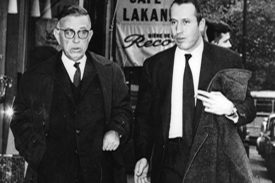I recently came upon two statements by atheistic philosopher Jean-Paul Sartre, which would have convinced me, if I needed convincing, of the importance of reading great literature. What we read can profoundly influence our image of ourselves and our image of God.
Great literature can present an important challenge to the reader. The following are Sartre’s two statements: “We want the work (of fiction) … to be explicitly conceived as a weapon against evil.”
“Reading is a pact of generosity between author and reader. Each one trusts the other; each one counts on the other, demands of the other as much as he demands of himself … There is then established a dialectical going-and-coming; when I read, I make demands; if my demands are met, what I am then reading provokes me to demand more of the author, which means to demand of the author that he demand more of me. And, vice versa, the author’s demand is that I carry my demands to the highest pitch.”
What I take from Sartre’s comments is that reading can be an important challenge to the reader because, we hope, writing has been an important challenge to the author. I imagine that if someone decides to read good literature, anything might happen. Writing this series of columns about Edwin O’Connor’s novel “The Edge of Sadness” has led me to browse through Flannery O’Connor’s collection of essays, “Mystery and Manners,” a collection I like very much.
Many years ago, I read Flannery’s two novels “Wise Blood” and “The Violent Bear It Away,” and found both demanding and provocative. I find her essays filled with wisdom. Some of them are so insightful that they seem to transcend the time in which they were written, several about 60 years ago, and read as though they were written yesterday.

Sartre, after announcing in Paris that he had rejected the Nobel Prize for Literature.(Photo: Central Press/Getty Images)
Flannery must have been an exceptionally intelligent person. The following comment by Flannery I think applies to many contemporary authors: “We live in an unbelieving age but one which is markedly and lopsidedly spiritual. There is one type of modern man who recognizes spirit in himself but who fails to recognize a being outside himself whom he can adore as Creator and Lord, consequently he has become his own ultimate concern.” (p. 159)
O’Connor’s description does not apply to authors of Catholic novels. There are some Catholic novels, I am thinking of Graham Greene’s “The End of the Affair” and “The Power and the Glory,” in which God is the main character.
I don’t think God is the main character in “The Edge of Sadness,” but God’s presence touches the main character, Father Hugh Kennedy, deeply.
Thinking about the awesome mystery of prayer, Father Kennedy reflects on how routine can interfere with the priest’s experience of awe and wonder: “The priest saying Mass knows exactly what he is doing, he knows that the words he repeats day after day are the gravest words he will ever speak, that they are in fact the very core of his belief and of his being, yet in spite of this there comes that moment when, with a sudden shock, he realizes that his mind has been wandering — for exactly how long he does not know — and that the words of the Divine Sacrifice have been little more than a buzzing background blur. Which is a strong signal to keep his guard up in the future. But because the dangers of routine are what they are, and — more important — because we are what we are, this is easier said than done, and so, sometimes and unhappily, there are priests who unintentionally but carelessly begin to elide, to speed up, even to skip, until in their hands the Mass becomes a lightning travesty of itself and startled parishioners find that they are out of church almost as soon as they came in.” (pp. 316-317)
These words might be spoken by a retreat master speaking to a group of priests. Of course I am quoting them out of context. In the middle of O’Connor’s novel, they come across as an accurate observation and a gentle, charitable warning. Sixty years ago when I first read “The Edge of Sadness,” I marveled that a layman could have such perceptive insights into the life of a priest.
When I re-read it recently, I marveled at O’Connor’s insights not only into the lives of priests but into human nature, into the mystery that every person is. And perhaps more than anything else, the author’s charitable outlook toward his characters I find beautiful.
